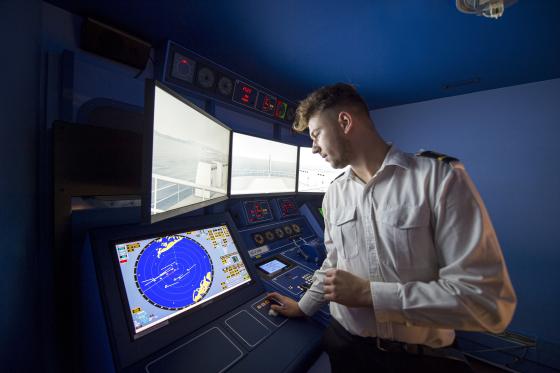Research

Overview
Research at the AMA assumes interdisciplinary questions and approaches. The AMA exploits this interdisciplinary character, in addition to the obvious maritime practical experience, in national and international networks AMA actively searches for such networks. This research can be practice-oriented or applied in nature: practice-oriented research originates from concrete questions within the educational and/or professional practice and strives for multidisciplinary solutions that are applicable/usable within that same practice. Applied research starts from fundamental scientific knowledge and uses this knowledge in real examples and situations.
Practice-oriented research is full-fledged research that meets all academic traditions and requirements but is close to practical questions from the field. In both cases, the researcher relies on academic ways of thinking and working: a correct experimental setup, statistical approach to data, design engineering, objective surveying, starting from a clear research question formulated according to the SMART principle. Academizing, on the other hand, for the AMA is not a process in which we drop this practical approach, but one in which we strengthen our research methodological approach and deepen the insights obtained.
In terms of content, the AMA's research currently focuses on three areas of expertise: (1) ship emissions and sustainable maritime transport, (2) combating corrosion and fouling, and (3) training maritime officers for the 21st century. These three areas of expertise are closely intertwined with the two existing courses, and the research conducted is always based on concrete questions and needs from the field and is also carried out in cooperation with business partners: research with companies on smart maintenance of engines, detection of corrosion of maritime industrial installations, the use of alternative carbon-neutral fuel types for inland navigation, etc.
How?
The structural decree in Belgium provides for professional bachelors on the one hand and academic bachelors and masters on the other. The Nautical Sciences program of the AMA consists of a three-year academic bachelor and then a one-year master, and since the 2021-2022 academic year, the Marine Engineering program also becomes an academic program (Bachelor and Master). For this, the same accreditation must be obtained as that of universities. To obtain the necessary support in this academization process, the AMA is part of the AUHA (Associatie Universiteit & Hogescholen Antwerpen). In 2003, for the first time, the University of Antwerp released resources from its own Special Research Fund, BOF for short, for scientific research to support the academization of the association's colleges.
To fund the AMA's scientific projects, there are several grant channels that our researchers can use
- In cooperation with the University of Antwerp, there are the BOF academic projects.
- In the Professional Bachelor of Marine Engineering program, research is supported for the time being through the funds for project-based scientific research (PWO research project).
- There is an opportunity within the AMA to initiate internal research projects with funding from its own research resources and/or tax recovery.
- The European Commission also provides funds for projects (European Research Projects within the Horizon and Interreg programs).
An overview of current projects shows how those funds are being used in ongoing research.
In addition, at the Antwerp Maritime Academy there is the possibility to obtain a doctorate in Nautical Sciences. This degree is awarded in cooperation with the University of Antwerp.
Contact
Dr. Marc Vervoort
Coordinator of Scientific Research/Doctorates
tel. 03-205 64 65
marc.vervoort@hzs.be
Dr. Olivier Schalm
Scientific advisor/Internationalization
tel. 03-205 64 45
olivier.schalm@hzs.be
Dr. Geert Potters
Coordinator of Scientific Research/External Projects
0496 208773
geert.potters@hzs.be
research@hzs.be
Ilse Bogaert
Science Communications Coordinator
tel. 03-205.64.66
ilse.bogaert@hzs.be

